- Home
- Richard F. Weyand
EMPIRE: Resurgence Page 4
EMPIRE: Resurgence Read online
Page 4
“What sort of items are we talking about, Colonel?”
“As one example, there’s a decommissioned ship-to-ship missile in the museum, Sir. It’s thirty feet long and over five feet in diameter and, even without fuel and warhead, it’s pretty heavy. They might have removed the ceiling from the freight elevator to get it up there in the first place. But we don’t need to get it out of the building just to bring it back. We’ll move it out of the way and do that corner of the floor later. Most of the other items, including a decommissioned warhead and other weapons, are smaller. Oh, except for the armor. We actually have tanks and APCs in the building, but they’re on the main floor and they came in the freight entrance.”
“And you feel the refurbishment is necessary, Colonel?”
“Yes, Sir. I don’t know if you’ve been through the museum recently, but most of it has not been upgraded in over a hundred years. It’s all looking a little tired and neglected. And, as it is the Imperial Marine Academy’s trust to maintain the museum, it’s a reflection on us as well.”
“I see. I did go through the museum recently, in considering your plan, and I agree with you, Colonel, but I wanted to hear you say it.”
Hansen nodded. He looked down at the papers in front of him, signed the top sheet, and set it off to the side.
“Well, it looks like a good plan to me, Colonel, and I’ve just signed off on it. You have the rest of the summer to get ready, as we won’t close the museum while children are out of school, during family vacation season. You have the whole school year until the beginning of next summer to get it all done, so you need to hump this thing along. We want to be open for vacation season again. Given the relatively small sizes of the individual expenditures, your effort is exempt from normal bid review requirements, or you’d be at it ten years.”
“Yes, Sir. Thank you, Sir.”
Hansen stood behind his desk and reached out and shook Ryan’s hand.
“Thank you, Colonel. It’s time and past time someone did something about it. Nobody ever had a plan to make it work before you started in on it.”
Hansen nodded once sharply at Ryan, then sat down.
“Dismissed.”
Ryan saluted and left.
Ryan had been working on the plan off and on for months, in case his proposal was approved. He had lists of vendors for carpeting, furnishings, painting, moving, refurbishing displays, reworking video and VR presentations. Most of these were big vendors, the sort who could be trusted to take on a project this big and do a bang-up job on it. They would want to be able to brag to their corporate customers they had provided services to the refurbishment of the Imperial War Museum. It would not be a struggle for them, it would be a showcase piece.
He really did plan to do a great job on the refurbishment. He knew Hansen and others would look in on the work as it progressed, and he needed to make sure they were happy with it as it went along. So he was not planning a slapdash job at all, even though it would not last long.
And he had one special vendor selected already. Oh, he would ask for bids, treating it just like any other project in refurbishing the museum, but he knew who he would select for that job. The refurbishment of the decommissioned warhead from a ship-to-ship missile – a ten megaton nuclear device – was a special case.
The Zoo was working all summer, too. The young people who made up most of the Zoo’s denizens often took their vacations during the summer. Many of them had children at home, and the summer break from school was their opportunity to take some time off with their families. The work went on through the summer, however.
“OK, so it looks like we’re all here this week. Where are we on the descendants project?” Matthew Houseman asked his group.
“We got all the data from running ‘where is he’ against every one of the descendants for the last three generations,” Rick Pender said. “Lots of confirmed deaths, when their VR nanites reported death of the host, so we set those aside. Lots of people still alive, and active under their own names. We set those aside in a different group. We ended up with a subset of the descendants for whom we have no death record, and no record of their current whereabouts.”
“So that’s our starting point?” Denise Coutard asked.
“No, not quite,” Pender said. “We did one more split. Those who showed up in VR – who registered with the system in their own names as children – and those who didn’t. The first group includes the people we matched with aliases before, the multiple-ID potential assassins the sector governors and old Alliance royalty found, and a bunch of other people we should probably try to match with aliases now.
“The second group, I think, contains two groups of people. One is infant mortality. There would be no death report coming in from their nanites, because they didn’t have nanites yet. Probably a quiet family funeral, burial in the family plot. Those may not have been recorded anywhere. The second, though, is potentially people who registered into the VR system under an assumed name, right off.”
“At age four?”Lucia Martelli asked.
“Sure,” Houseman said. “Children don’t have any problems playing pretend games. ‘Let’s play a game, Jimmy. Tell the computer your name is Stanley.’”
“Exactly,” Pender said.
“Then how do we tell those two groups apart?” Tom Mayall asked.
Everyone turned to look at Mayall. He was a great data miner, but he didn’t talk much. Hardly at all. Well, never, really.
“That’s the thousand-credit question,” Houseman said. “Rick?”
“I don’t know. Now, we did compare the infant mortality in the descendants families with the infant mortality in their economic group on their own planets. And the infant mortality in some families is significantly higher than you’d expect.”
“Ah, ha!” Houseman said.
“Yes,” Pender said. “And the higher apparent infant mortality is in the families that had fewer people found in Their Majesties’ purge.”
“Well, there we go, then,” Houseman said, and others nodded.
“Wait. I don’t get that,” Coutard said.
“The way we found people in Their Majesties’ purge was to match up aliases with similar-sounding names. That appears to have been a strategy of some or most of the families in placing their agents,” Lois Costas said. “Families with a different strategy – like having their kids initially sign up in VR under assumed names – their agents we wouldn’t have found.”
“Got it. Of course. Sorry,” Coutard said.
“No, that’s OK,” Houseman said. “We work best when we keep everybody on the same page.”
He turned to Pender.
“Anything else?”
“Just one more thing. Harry’s group posted his head-of-family research. We correlated it with our findings. The apparent infant mortality in families who didn’t have many people uncovered in the purge increases as you get closer in the family tree to the head of family.”
“OK, that one I get,” Coutard said. “The more distant relatives are less likely to be involved in the head of family’s scheming. At least at that level, as a covert operative. There would be more trust of a closer relative, one they knew better.”
“Exactly,” Pender said.
“OK,” Houseman said. “Given all that, now what do we do?”
“Turn this over to Investigations and let them start monitoring communications, I think,” Pender said. “For the heads of those families. Kerrigan, Sciacca, the rest. See if we can’t pick up who the matching people are to the babies that disappeared. Those people will be the most dangerous agents.”
Houseman nodded.
“Makes sense to me. Who’s going to write this up and post it?”
“Already posted, Matt,” Pender said.
“Excellent. Nice job, Rick. Moving on, how is the project for the Budget Office going, Denise?”
Also that summer came the one-year anniversary of the coronation and the assassination attempt on Burke. The corona
tion having been on a Friday, the first anniversary was on a Saturday in mid-July.
Ardmore and Burke celebrated on the pool deck. After lunch, they split a small cake – more of a large cupcake, really – between them.
“A year already,” Ardmore said.
“But what a year,” Burke said around a mouthful of cake.
“Well, the first half was something, but the second half has been OK. Quieter.”
“I still think it’s too quiet.”
“I know. They’re working on it.”
“Well, at least I’m not freezing anymore.”
A month later, the temperature complaint was back, though with a difference.
“I finally stopped being cold, for three whole months, and now I’m hot all the time instead,” Burke complained to Ardmore.
She was sitting on the bottom steps in the shallow end of the pool with the water up to her armpits. He was laying on the chaise, which he’d moved up to the edge of the pool to be by her.
“Isn’t that normal?” Ardmore asked.
“Normal, yes. Comfortable, no. This summer seems endless. C’mon, September!”
Ardmore laughed.
“You only have a few more weeks to go,” he said.
“I think I’ll just spend them sitting here.”
“In the pool?”
“Yeah. I can VR in from here,” Burke said.
“There’s a question. Do you feel hot in VR?”
“No, thank goodness.”
“Then just go into work in VR,” Ardmore said. “Done. No sense being uncomfortable. You don’t even need to sit in the pool.”
Burke considered, then nodded.
“That’s probably smart. Nobody wants a surly Empress.”
“Well, I sure don’t.”
“Speaking of which, how’s the Zoo doing on our project? I still have that itch between my shoulder blades.”
“Good, I think,” Ardmore said. “They’ve determined we missed a bunch of agents, and where they’re from, but not where they are now.”
“Oh, great. So how do we find them?”
“Surveillance. We have to wait for their bosses to talk to them.”
“And if they don’t?” Burke asked. “If they practice basic communications discipline? Then what?”
“Then it will be harder.”
The shipping container was delivered to its destination, a company on Garland. It sat there for two weeks, and then, presumably after it had been unloaded and reloaded with outbound goods, it was picked up again.
Except its contents – two crates strapped to the floor rails – had never been touched at all.
It was taken back to the spaceport with a new bill of lading and destination.
Silver City, on Argent, provincial capital of the Argent Province, in Center Sector.
Free Trade
“Hey, Rob,” the job super called to the shift foreman, “how are those new CM&M machines working out?”
“They’re great, Bill. We been running ‘em twenty-four-seven for a month, and we haven’t had a single failure.”
“Wait. Not one failure? We been having to keep two extra of the RSC machines on site all the time just to make sure we could keep the work going.”
“Yeah, I know,” the shift foreman replied. “Not with the CM&M machines. And get this. We’re running maintenance intervals three times those of the RSC machines.”
“Three times the RSC machines? Aren’t you pushing your luck, Rob?”
“Nah. The specified maintenance interval is four times that of the RSC machines. We only went three times because we couldn’t quite believe it, given how hard we’re pushin’ ‘em. The CM&M machines don’t care. We pushed the payloads up by half again and they don’t give a damn.”
“No shit. So what are we gonna do with the RSC machines?” the job super asked.
“Sell ‘em to somebody who doesn’t push ‘em hard, maybe? Or just sell ‘em for scrap. But on that big job down in Ross? Get more o’ these. The guys love ‘em.”
The job super looked up the slope to where the new highway was being cut through the mountains, watched the giant earthmovers crawling back and forth on the slope.
“All right. I’ll let management know. Looks like we finally found a winner.”
“For this kinda job, yeah. We couldn’t ask for more, Bill. We really couldn’t.”
Calla Guilfoil, the shipping manager for Connacht Machinery and Manufacturing – one of the Kerrigan family’s companies – plopped into her big easy chair in the living room. She sighed loudly.
“What a day. I’m beat.”
“I thought things were going to go easier in shipping, what with free trade and all,” her husband Nevan said. “That it would hurt business. Last I knew, you were thinking there were going to have to be layoffs.”
“Just the opposite. I expected imports would kill a lot of our business once trade barriers were lifted. I told you that. That’s what everyone at work expected. But we’re shipping more product, not less. I was shorthanded before, but this is getting ridiculous.”
“You’re shipping more?”
“Yeah,” Calla said. “The new business is all coming from out-sector. Sure, cheaper products are coming into Connacht Sector, but our higher-end products have more market now. People in other sectors who couldn’t buy our products before now can, and they’re doing so. In droves. Apparently there was a big market for higher-quality products out there we were blocked from selling into by the other sectors’ trade barriers. Not anymore. For every old customer we lose, we’re getting two or three new ones. We’re having a hell of a time keeping up with it.”
“What do you do now?”
“They’re finally talking about letting me hire some additional people. With all the money coming in, we can afford it. They thought things were going to go the other way, so management was blocking any new hiring.”
“So maybe there’s some relief coming?” Nevan asked.
“Not on the short term. Those new people have to be trained as well. There’s nobody I can just plop down and have be productive right away.”
“Well, at least there won’t be layoffs.”
“There is that,” Calla said.
“All right,” said Conor Flinn, the CEO of Connacht Machinery and Manufacturing said. “I have a meeting with the chairman tomorrow, and I need to know what’s going on.”
“Yes, sir,” said Sinead Cregg, his head of marketing. “The first item is what we feared would happen. We’re losing domestic market share to cheaper imports from some out-sector manufacturers. We may lose as much as two-thirds of our domestic market in Connacht Sector. That’s what we were afraid of, and that’s happening.”
“Then why are sales booming?”
“We underestimated the out-sector demand for a higher-end product. At first, it was just trial purchases from a few big customers. But as people gained experience with our products, and word spread, sales just kept ramping up, and there’s no sign of it slowing down yet. If you have a big machine go down at a construction site, you’re looking at big losses. Demurrage on the site and all the other equipment, paying workers to stand around, contract penalties – it all adds up. So, for as expensive as our big equipment is, people with a lot at risk consider it a cheap investment. Risk avoidance. Simple as that.”
“And it’s our big equipment sales that are booming?” Flinn asked.
“Yes, sir. The bigger the equipment, the bigger the resulting losses when it breaks. Now, smaller outfits, smaller jobs, those we still don’t get. The price difference there is a deal breaker.”
“What’s customer satisfaction doing?”
“Up across the board,” Cregg said. “When people have more choices, they tend to be happy with the choice they made. But the reviews we’re getting on VR from people who couldn’t buy our product before are the best. Oh, and some of the customers we thought we lost are coming back to us.”
“Why are they coming back?”<
br />
“They tried the cheaper product, and found out why it was cheaper. They came back to quality. Our marketing communications, both in-sector and out-sector, have been pushing the quality issue hard. Others are happy with the savings, and are willing to work around the quality issues.”
“So the in-sector losses aren’t a problem,” Flinn said.
“No, sir. I would give up the entire domestic market for the export market we’re getting now. There are seventy-eight other sectors out there, and that’s driving the increase in sales.”
“I always thought protective trade barriers helped us.”
“As long as other sectors had barriers against us, they did,” Clegg said. “If ours had come down while theirs stayed up, that would have hurt us badly. But taking them all down at once has worked really well for us.”
“So all good news, then. Excellent. I wasn’t looking forward to this meeting with Ms. Kerrigan. She separates the world into results and excuses, and excuses are not tolerated. You have the detailed numbers for me?”
“Yes, sir,” Clegg said, pushing him the document in VR.
Connacht Machinery and Manufacturing’s headquarters was in Galway City, on the planet Galway. For the meeting with Maire Kerrigan, Conor Flinn had his car and driver take him out to Kerrigan House, an hour outside the city. The butler showed him into her office, just off the main entryway. Kerrigan was seated behind her desk.
“Come in, Conor, come in. Have a seat.”
“Thank you, Maire.”
“So what have you got for me, Conor? Good news or bad news.”
“Actually, good news, Maire. I know I warned about the impact of dropping the trade barriers on our in-sector business, but the out-sector business we’ve picked up is twice or more what we’ve lost.”
“Really?”
“Oh, yes. And that’s just so far. It’s still ramping up.”
Flinn pushed her the marketing summaries, then walked her through the numbers. When he was finished, Kerrigan sat back in her chair and considered.

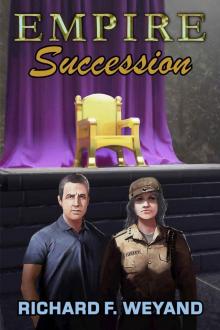 EMPIRE: Succession
EMPIRE: Succession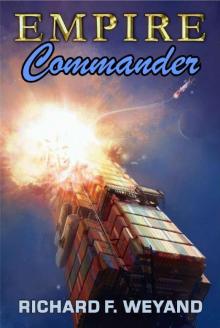 Commander
Commander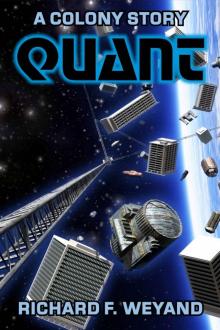 QUANT (COLONY Book 1)
QUANT (COLONY Book 1) EMPIRE: Renewal
EMPIRE: Renewal GALACTIC SURVEY (COLONY Book 3)
GALACTIC SURVEY (COLONY Book 3)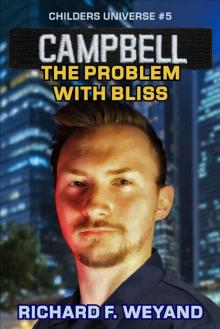 Campbell- The Problem With Bliss
Campbell- The Problem With Bliss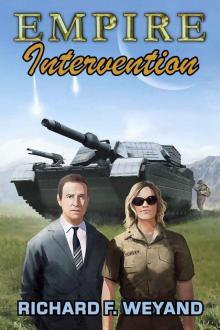 EMPIRE: Intervention (EMPIRE SERIES Book 13)
EMPIRE: Intervention (EMPIRE SERIES Book 13)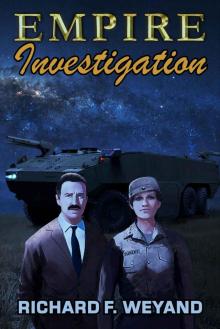 EMPIRE: Investigation
EMPIRE: Investigation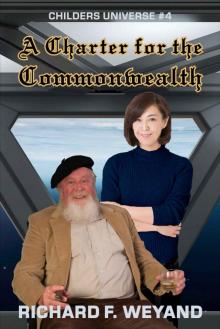 A Charter for the Commonwealth
A Charter for the Commonwealth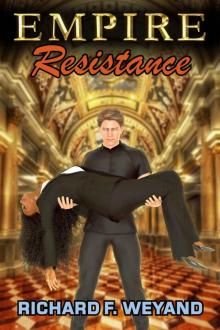 EMPIRE: Resistance
EMPIRE: Resistance EMPIRE: Warlord (EMPIRE SERIES Book 5)
EMPIRE: Warlord (EMPIRE SERIES Book 5) EMPIRE: Resurgence
EMPIRE: Resurgence EMPIRE: Conqueror (EMPIRE SERIES Book 6)
EMPIRE: Conqueror (EMPIRE SERIES Book 6)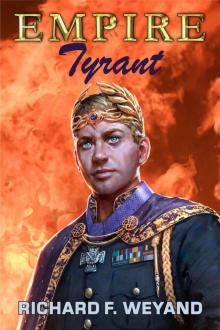 Tyrant
Tyrant Usurper
Usurper Galactic Mail: Revolution! (Childers Universe Book 3)
Galactic Mail: Revolution! (Childers Universe Book 3) Galactic Mail_Revolution!
Galactic Mail_Revolution! Childers
Childers CHILDERS_Absurd Proposals
CHILDERS_Absurd Proposals